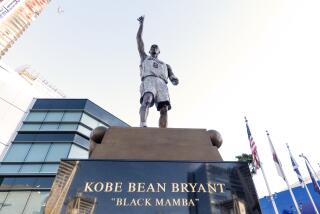TENNIS / MEN AT LOS ANGELES : Edberg Takes Bad Calls With a Good Win
- Share via
How can you tell Stefan Edberg is mad?
“When I get quiet,” Edberg said.
So it was probably a good sign Thursday night that Edberg kept on speaking with chair umpire Peter Richter when a few calls were under discussion during Edberg’s 6-3, 6-4 third-round victory over fellow Swede Peter Lundgren in the Volvo/Los Angeles tournament.
Edberg may have gotten a little mad, but he kept iceberg cool.
This is the most Edberg would admit to: “I got a little bit cross.”
Neither Edberg nor Lundgren had much nice to say about a half dozen disputed calls, which seemed to be distributed evenly between them, probably because the outcome of the match hinged on other factors.
Like Edberg, for example.
“His serve is solid, he’s overall consistent, he’s No. 2 in the world and his volley is probably the best in the world,” said Lundgren, who should know since he hasn’t beaten Edberg since the qualifying round of the Swedish national championships when Edberg was 16.
Said Lundgren: “We know each other in and out.”
Lundgren complained that the linesmen seemed to be calling a different game than he was playing: “There were some ridiculous calls.”
But it was Edberg who ensured the direction of the match in the second set when he was served at 1-2 and trailed 15-40. Two big serves bailed Edberg out and when he saved a third break point, he closed the door on any chance Lundgren had to get back into the match.
“I was quite pleased,” Edberg said. And the questionable calls?
“There were quite a few bad calls, but that’s going to happen in a few matches,” he said. “It’s quite normal.”
Actually, the Volvo/Los Angeles tournament is the site of Edberg’s only fine as a pro. He was fined in 1986 for hitting a ball after the point ended. Edberg must have been mad then because he didn’t say anything about it.
Edberg paid the $350 fine.
“I have made up the money,” he said.
Pete Sampras had some making up to do after losing to Shuzo Matsuoka last week. The rematch was Thursday and Sampras got even with a 6-3, 6-4 victory.
“When I played him last, it was a match I should have own, so it was nice to get a little revenge,” Sampras said.
In the quarterfinals, Sampras plays Amos Mansdorf, who beat qualifier Gianluca Pozzi, 6-4, 6-3. Edberg moved on to the quarterfinals where he will trade backhands with Aaron Krickstein.
As soon as he squeezed past Jason Stoltenberg, 6-3, 3-6, 6-3, Krickstein revealed he was already working on a game plan for Edberg and, hopefully, beyond.
“I’ve got to go from playing OK- pretty good to playing my best,” Krickstein said. “How I am going to do that, I’m not quite sure.”
This is just how Matsuoka felt trying to apply a racket to some of the balls that Sampras struck in his direction. If Sampras has been somewhat inconsistent this year, his serve has had the same tendency to disappear from time to time, usually just long enough for Sampras to get beat.
But there was Sampras serving for 5-3 in the second set and going like this: ace, service winner, ace, ace. Then he started the 10th and final game with a 117-m.p.h. ace and another service winner.
“His serve is well,” Matsuoka said. “I couldn’t touch it. I couldn’t do anything.”
Sampras finished with six aces, the same as Matsuoka, who hits hard but doesn’t follow it up. Yet Sampras’ serve was much more effective. From where he stood, right after finishing his follow-through, Sampras’ serve looked pretty good to him, since he won 42 of 56 points on his serve.
“When I’m loose and playing well, I think I’m a pretty tough person to beat,” Sampras said.
A week ago, he wasn’t tough to beat at all. In fact, Matsuoka did it in three sets in Montreal, administering a defeat Sampras blamed on a lack of concentration.
About the only thing Sampras failed to do was spread his aces out a bit. Instead, he sort of bunched them all together at the end, although it didn’t make much difference because Matsuoka said he was having a reading problem.
“If I read (the serve) wrong, there is no way I can touch it and the last two games, I was reading a different way,” Matsuoka said.
More to Read
Go beyond the scoreboard
Get the latest on L.A.'s teams in the daily Sports Report newsletter.
You may occasionally receive promotional content from the Los Angeles Times.










